牛津英语模块七第三单元Reading精品教案1
- 格式:doc
- 大小:22.00 KB
- 文档页数:3
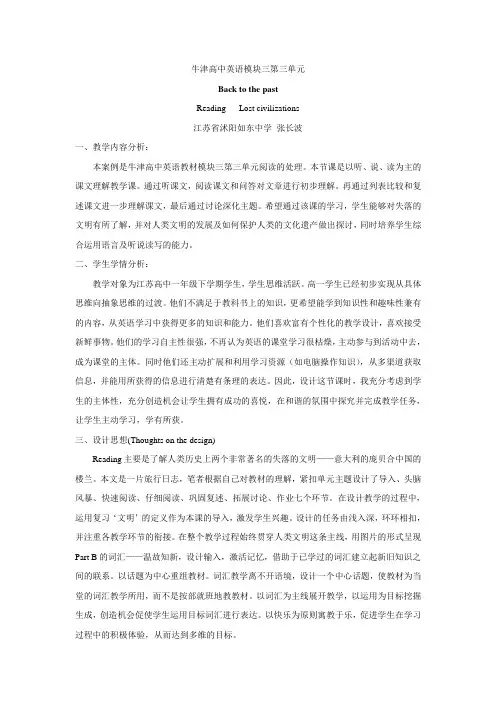
牛津高中英语模块三第三单元Back to the pastReading Lost civilizations江苏省沭阳如东中学张长波一、教学内容分析:本案例是牛津高中英语教材模块三第三单元阅读的处理。
本节课是以听、说、读为主的课文理解教学课。
通过听课文,阅读课文和问答对文章进行初步理解。
再通过列表比较和复述课文进一步理解课文,最后通过讨论深化主题。
希望通过该课的学习,学生能够对失落的文明有所了解,并对人类文明的发展及如何保护人类的文化遗产做出探讨,同时培养学生综合运用语言及听说读写的能力。
二、学生学情分析:教学对象为江苏高中一年级下学期学生,学生思维活跃。
高一学生已经初步实现从具体思维向抽象思维的过渡。
他们不满足于教科书上的知识,更希望能学到知识性和趣味性兼有的内容,从英语学习中获得更多的知识和能力。
他们喜欢富有个性化的教学设计,喜欢接受新鲜事物。
他们的学习自主性很强,不再认为英语的课堂学习很枯燥,主动参与到活动中去,成为课堂的主体。
同时他们还主动扩展和利用学习资源(如电脑操作知识),从多渠道获取信息,并能用所获得的信息进行清楚有条理的表达。
因此,设计这节课时,我充分考虑到学生的主体性,充分创造机会让学生拥有成功的喜悦,在和谐的氛围中探究并完成教学任务,让学生主动学习,学有所获。
三、设计思想(Thoughts on the design)Reading主要是了解人类历史上两个非常著名的失落的文明——意大利的庞贝合中国的楼兰。
本文是一片旅行日志,笔者根据自己对教材的理解,紧扣单元主题设计了导入、头脑风暴、快速阅读、仔细阅读、巩固复述、拓展讨论、作业七个环节。
在设计教学的过程中,运用复习‘文明’的定义作为本课的导入,激发学生兴趣。
设计的任务由浅入深,环环相扣,并注重各教学环节的衔接。
在整个教学过程始终贯穿人类文明这条主线,用图片的形式呈现Part B的词汇——温故知新,设计输入,激活记忆,借助于已学过的词汇建立起新旧知识之间的联系。
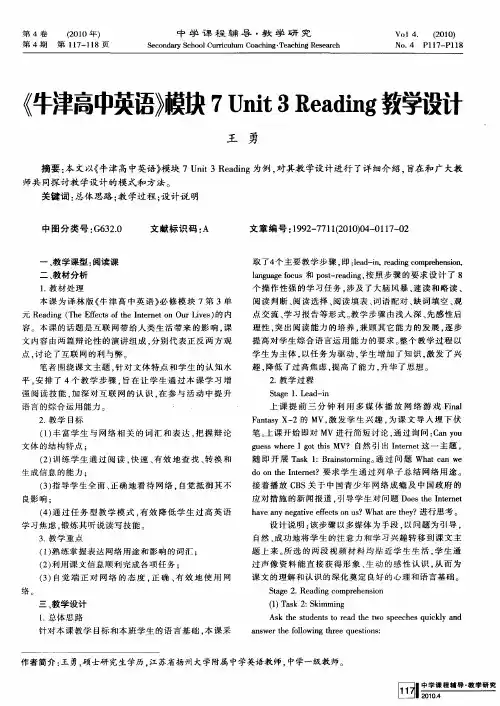
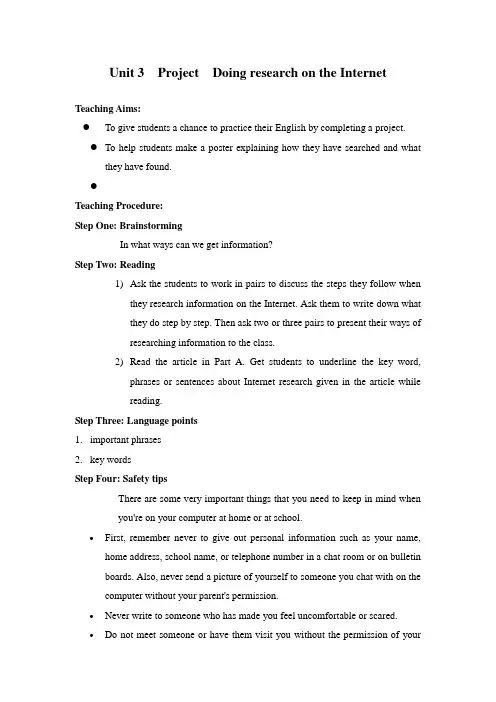
Unit 3 Project Doing research on the InternetTeaching Aims:●To give students a chance to practice their English by completing a project.●To help students make a poster explaining how they have searched and whatthey have found.●Teaching Procedure:Step One: BrainstormingIn what ways can we get information?Step Two: Reading1)Ask the students to work in pairs to discuss the steps they follow whenthey research information on the Internet. Ask them to write down whatthey do step by step. Then ask two or three pairs to present their ways ofresearching information to the class.2)Read the article in Part A. Get students to underline the key word,phrases or sentences about Internet research given in the article whilereading.Step Three: Language points1.important phrases2.key wordsStep Four: Safety tipsThere are some very important things that you need to keep in mind whenyou're on your computer at home or at school.•First, remember never to give out personal information such as your name, home address, school name, or telephone number in a chat room or on bulletin boards. Also, never send a picture of yourself to someone you chat with on the computer without your parent's permission.•Never write to someone who has made you feel uncomfortable or scared.•Do not meet someone or have them visit you without the permission of yourparents.•Tell your parents right away if you read anything on the Internet that makes you feel uncomfortable.•Remember that people online may not be who they say they are. Someone who says that "she" is a "12-year-old girl" could really be an older man.Step Five: Making a poster1)Ask the students to work in groups to discuss the questions in Part B.They should choose a topic to research on the Internet and then dividethe work among the group members.2)Ask each group to present their poster to the class. Other groups cangive their comments. Encourage students to decide which group hadmade the best use of the Internet and has found the true and accurateinformation.Step Six: Homework:1.Finish the poster2.Do B1 and B2 in Workbook.。
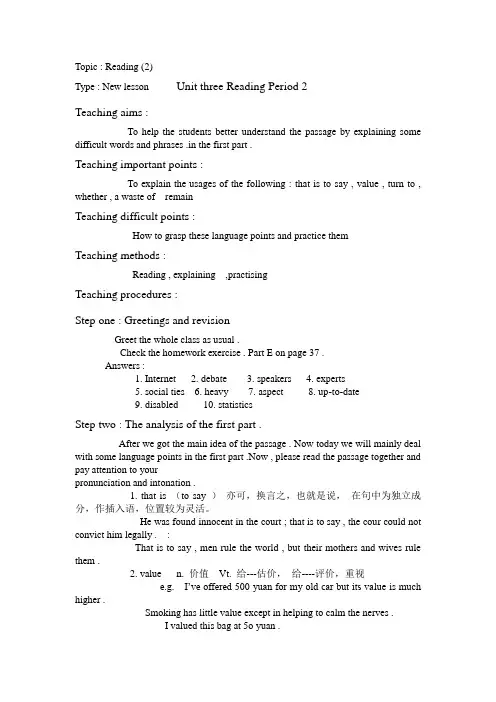
Topic : Reading (2)Type : New lesson Unit three Reading Period 2Teaching aims :To help the students better understand the passage by explaining some difficult words and phrases .in the first part .Teaching important points :To explain the usages of the following : that is to say , value , turn to , whether , a waste of remainTeaching difficult points :How to grasp these language points and practice themTeaching methods :Reading , explaining ,practisingTeaching procedures :Step one : Greetings and revisionGreet the whole class as usual .Check the homework exercise . Part E on page 37 .Answers :1. Internet2. debate3. speakers4. experts5. social ties6. heavy7. aspect8. up-to-date9. disabled 10. statisticsStep two : The analysis of the first part .After we got the main idea of the passage . Now today we will mainly deal with some language points in the first part .Now , please read the passage together and pay attention to yourpronunciation and intonation .1. that is (to say )亦可,换言之,也就是说,在句中为独立成分,作插入语,位置较为灵活。
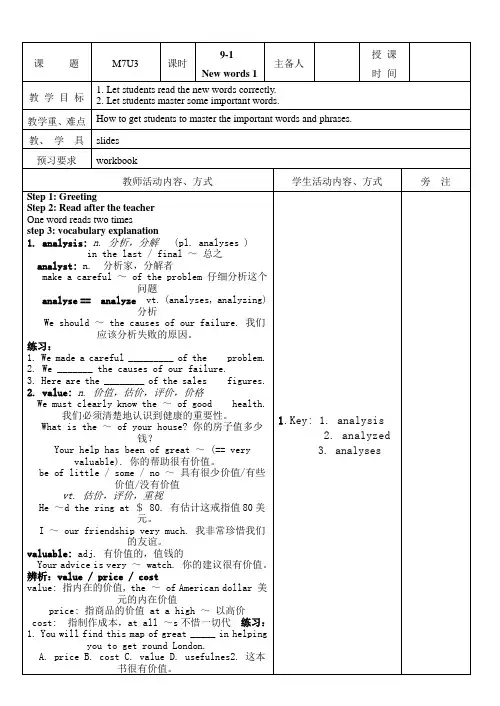
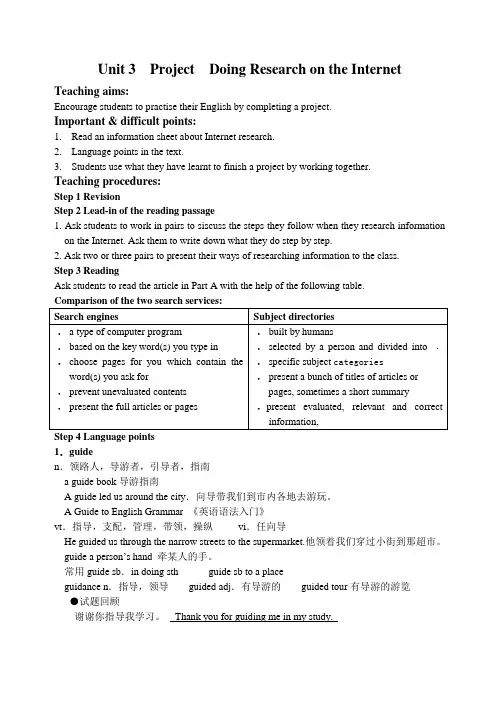
Unit 3 Project Doing Research on the InternetTeaching aims:Encourage students to practise their English by completing a project.Important & difficult points:1.Read an information sheet about Internet research.nguage points in the text.3.Students use what they have learnt to finish a project by working together.Teaching procedures:Step 1 RevisionStep 2 Lead-in of the reading passage1. Ask students to work in pairs to siscuss the steps they follow when they research information on the Internet. Ask them to write down what they do step by step.2. Ask two or three pairs to present their ways of researching information to the class.Step 3 ReadingAsk students to read the article in Part A with the help of the following table.Step 4 Language points1.guiden.领路人,导游者,引导者,指南a guide book导游指南A guide led us around the city.向导带我们到市内各地去游玩。
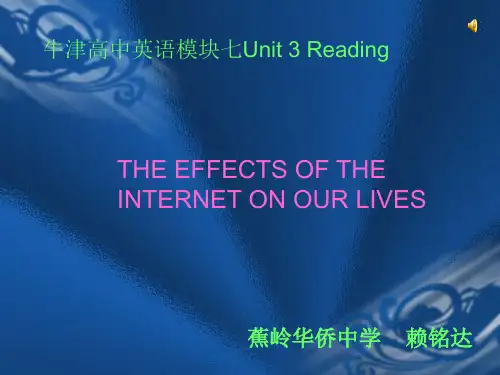
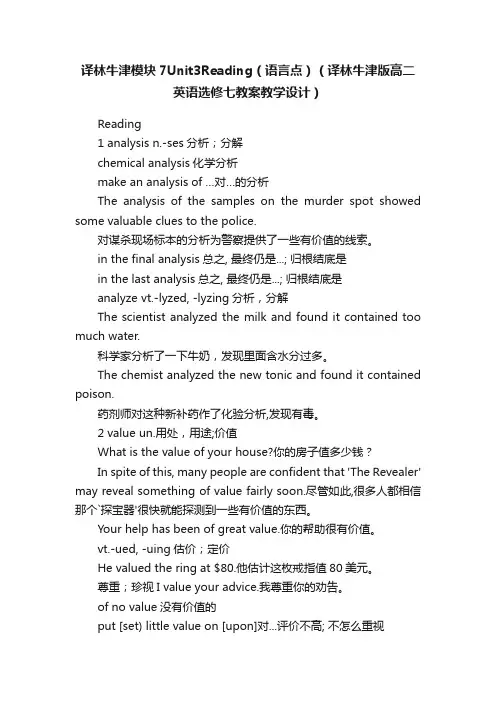
译林牛津模块7Unit3Reading(语言点)(译林牛津版高二英语选修七教案教学设计)Reading1 analysis n.-ses分析;分解chemical analysis化学分析make an analysis of …对…的分析The analysis of the samples on the murder spot showed some valuable clues to the police.对谋杀现场标本的分析为警察提供了一些有价值的线索。
in the final analysis总之, 最终仍是...; 归根结底是in the last analysis总之, 最终仍是...; 归根结底是analyze vt.-lyzed, -lyzing分析,分解The scientist analyzed the milk and found it contained too much water.科学家分析了一下牛奶,发现里面含水分过多。
The chemist analyzed the new tonic and found it contained poison.药剂师对这种新补药作了化验分析,发现有毒。
2 value un.用处,用途;价值What is the value of your house?你的房子值多少钱?In spite of this, many people are confident that 'The Revealer' may reveal something of value fairly soon.尽管如此,很多人都相信那个`探宝器'很快就能探测到一些有价值的东西。
Your help has been of great value.你的帮助很有价值。
vt.-ued, -uing估价;定价He valued the ring at $80.他估计这枚戒指值80美元。
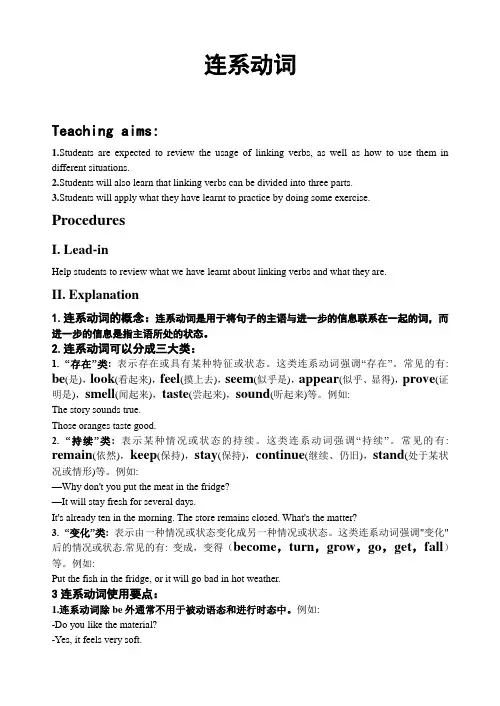
连系动词Teaching aims:1.Students are expected to review the usage of linking verbs, as well as how to use them in different situations.2.Students will also learn that linking verbs can be divided into three parts.3.Students will apply what they have learnt to practice by doing some exercise. ProceduresI. Lead-inHelp students to review what we have learnt about linking verbs and what they are.II. Explanation1.连系动词的概念:连系动词是用于将句子的主语与进一步的信息联系在一起的词,而进一步的信息是指主语所处的状态。
2.连系动词可以分成三大类:1. “存在”类: 表示存在或具有某种特征或状态。
这类连系动词强调“存在”。
常见的有: be(是),look(看起来),feel(摸上去),seem(似乎是),appear(似乎、显得),prove(证明是),smell(闻起来),taste(尝起来),sound(听起来)等。
例如:The story sounds true.Those oranges taste good.2. “持续”类: 表示某种情况或状态的持续。
这类连系动词强调“持续”。
常见的有: remain(依然),keep(保持),stay(保持),continue(继续、仍旧),stand(处于某状况或情形)等。
例如:—Why don't you put the meat in the fridge?—It will stay fresh for several days.It's already ten in the morning. The store remains closed. What's the matter?3. “变化”类: 表示由一种情况或状态变化成另一种情况或状态。
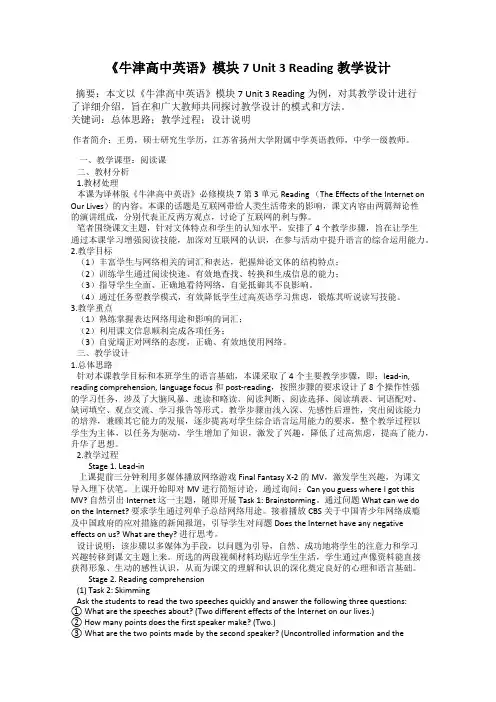
《牛津高中英语》模块7 Unit 3 Reading教学设计摘要:本文以《牛津高中英语》模块7 Unit 3 Reading为例,对其教学设计进行了详细介绍,旨在和广大教师共同探讨教学设计的模式和方法。
关键词:总体思路;教学过程;设计说明作者简介:王勇,硕士研究生学历,江苏省扬州大学附属中学英语教师,中学一级教师。
一、教学课型:阅读课二、教材分析1.教材处理本课为译林版《牛津高中英语》必修模块7第3单元Reading (The Effects of the Internet on Our Lives)的内容。
本课的话题是互联网带给人类生活带来的影响,课文内容由两篇辩论性的演讲组成,分别代表正反两方观点,讨论了互联网的利与弊。
笔者围绕课文主题,针对文体特点和学生的认知水平,安排了4个教学步骤,旨在让学生通过本课学习增强阅读技能,加深对互联网的认识,在参与活动中提升语言的综合运用能力。
2.教学目标(1)丰富学生与网络相关的词汇和表达,把握辩论文体的结构特点;(2)训练学生通过阅读快速、有效地查找、转换和生成信息的能力;(3)指导学生全面、正确地看待网络,自觉抵御其不良影响。
(4)通过任务型教学模式,有效降低学生过高英语学习焦虑,锻炼其听说读写技能。
3.教学重点(1)熟练掌握表达网络用途和影响的词汇;(2)利用课文信息顺利完成各项任务;(3)自觉端正对网络的态度,正确、有效地使用网络。
三、教学设计1.总体思路针对本课教学目标和本班学生的语言基础,本课采取了4个主要教学步骤,即:lead-in, reading comprehension, language focus 和post-reading,按照步骤的要求设计了8个操作性强的学习任务,涉及了大脑风暴、速读和略读、阅读判断、阅读选择、阅读填表、词语配对、缺词填空、观点交流、学习报告等形式。
教学步骤由浅入深、先感性后理性,突出阅读能力的培养,兼顾其它能力的发展,逐步提高对学生综合语言运用能力的要求。
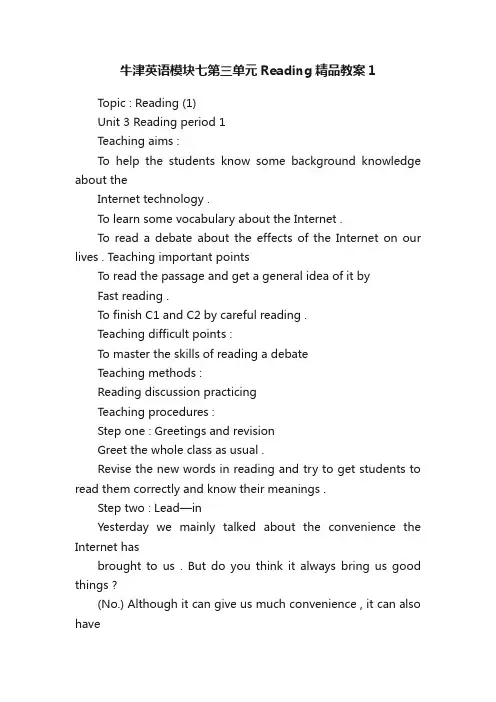
牛津英语模块七第三单元Reading精品教案1Topic : Reading (1)Unit 3 Reading period 1Teaching aims :To help the students know some background knowledge about theInternet technology .To learn some vocabulary about the Internet .To read a debate about the effects of the Internet on our lives . Teaching important pointsTo read the passage and get a general idea of it byFast reading .To finish C1 and C2 by careful reading .Teaching difficult points :To master the skills of reading a debateTeaching methods :Reading discussion practicingTeaching procedures :Step one : Greetings and revisionGreet the whole class as usual .Revise the new words in reading and try to get students to read them correctly and know their meanings .Step two : Lead—inYesterday we mainly talked about the convenience the Internet hasbrought to us . But do you think it always bring us good things ?(No.) Although it can give us much convenience , it can also havesome badeffect on us .Yes , can you give me someExamples of the two effects the Internet has on our daily lives .(Give the students a few minutes to discuss with their classmates and then ask some to list their opinions .) From your answers , we can find that some students think it has good effects ; some think it’s bad .That’s what we will mainly learn today .Now please turn to page 34 and let’s learn the reading strategy first .Step three : Reading strategyReading an argumentWhen you read an argument , you must remember that a speview is being given . If you know what to look for , you can be a better judge of whether the argument is well made .First know what the argument is about .Then find a list of the points the person wants or make or individual sub-arguments 。
牛津高中英语模块七第三单元阅读课说课稿一、教材分析本单元以“The Internet”为话题,旨在通过本单元教学,使学生了解互联网以及使用互联网的利与弊,掌握辩论稿的写作特色。
在Reading部分之前,welcome to the unit提供了四幅海报图片,要求学生根据图片讨论并回答相关问题,从而引出话题,激活学生对网络的相关知识,为后面的阅读文章做铺垫。
Reading呈现了一篇辩论稿,即两名学生在校际辩论会上所作的演讲的文字稿,辩论的内容是使用互联网的利与弊,同时也提供了如何阅读辩论稿的技巧。
A设置了几个问题,要求学生快速阅读文章并回答问题,检验学生对通篇阅读材料的整体理解;C1和C2分别是回答问题和支持与反对的练习,是对阅读细节的检验;D是一个词汇练习,帮助学生在语境中学习生词、意义和用法;E是一些词汇的应用性练习,要求学生根据前后文用适当的单词填空。
F是一个会话练习,要求学生根据提示问题,运用阅读文章所学的知识和词汇、句式谈论互联网的情况,是输出性的口头训练活动。
在这些练习中,D和E在布置预习任务时,就叫学生做好,所以课上没有花时间讲解了。
互联网是学生最乐于学习,也是最感兴趣的话题之一。
在本单元的welcome to the unit中,学生已经了解了互联网的相关信息,这为阅读课奠定了一定的基础。
另一方面,课文中出现了reading strategy, 教会学生如何阅读辩论稿。
所以说,这节阅读课在整个单元模块中起着比较重要的作用。
《普通高中英语课程标准(实验稿)》明确指出要积极发展学生自主学习的能力和合作精神,并且注重提高学生用英语获取信息、处理信息、分析问题和解决问题的能力,以及用英语进行思维和表达的能力。
所以,本节阅读课的教学设计力求达到这两个方面的要求。
二、教学目标1.语言知识目标:1)学生能够正确读写及运用以下单词:affair, value, forecast, acquire, sceptical, frequent, popularity, common, appearance, accurate, inaccuracy2)学生掌握下列词组的意思并能在句子中熟练运用:in need of, take advantage of, turn to, all sorts of, up-to-date, such as, be addicted to2.语言技能目标:1)强化略读、查读等阅读微技能,训练通过寻找关键词、主题句等方式更快速、更准确地确定文章的段落大意,理清文章的总体框架与脉络。
Word powerStep1: Brainstorming1. Guessing Game:At the beginning of today’s class, let’s play a guessing game. Here are several cards, each of which is related to the Internet or a computer. I’d like one of you to give a brief description of the2. Next time you are in our school’s computer room, notice how we operate a computer.Step 2: Vocabulary learning1. Do you know about the operation of a computer and the knowledge of Internet? We’ll conduct a question-and-answer activity. Please speak out what you know as much as possible. The purpose of this activity is to make you more familiar with the words and terms connected to the Internet.2. Read Part A and make sure that you know what these words in blue mean or refer to in Chinese.3. Focus on Part B and read the sentences individually first. Make sure that you know what these words mean or refer to in Chinese.4. Read the e-mail in Part C, which was written by Kenny to his grandpa about the Internet. You are required to complete the e-mail with the words discussed on page 38. Try to guess theStep 3: Vocabulary extension1. In Part D, you will learn some abbreviations that people use in Internet chat rooms. Whether you have used these abbreviations before? As the abbreviations use only the first letters of each word, it is fast to type them when chatting online. It is very popular among young people to use these words.2. You can sometimes work out what an Internet abbreviation stands for by reading the letters out loud, for example:B4 (before)OIC (oh, I see.)CUL8R (see you later.)I’ll explain some other expressions to you:BTW (by the way)BFN (bye for now)4. Reading:words: 288 time: 4’20’’The Internet began in the 1960s as a small network of academic and government computers primarily involved in research for the U.S. military. Originally limited to researchers at a handful of universities and government facilities, the Internet has quickly become a worldwide network providing users with information on a range of subjects and allowing them to purchase goods directly from companies via computer. By 1999, 84 million U.S. citizens had access to the Internet at home or work. More and more Americans are paying bills, shopping, ordering airline tickets, and purchasing stocks via computer over the Internet.Internet banking is also becoming increasingly popular. With lower overhead costs in terms of staffing and office space, Internet banks are able to offer higher interest rates on deposits and charge lower rates on loans than traditional banks. “Brick and mortar" banks are increasingly offering online banking services via transactional websites to complement their traditional services. At present, 14 percent of Internet households conduct their banking by means of the Internet, and the figure is expected to double or triple during the next two or three years.Increasing commercial use of the Internet has heightened security and privacy concerns. With a credit or debit card, an Internet user can order almost anything from an Internet site and have it delivered to their home or office. Companies doing business over the Internet need sophisticated security measures to protect credit card, bank account, and social security numbers from unauthorized access as they pass across the Internet. Any organization that connects its networks to the global Internet must carefully control the access point to ensure that outsiders cannot disrupt the organization’s internal networks or gain unauthorized access to the organization’s computer systems and data.1. According to the text, Internet banking ________.A. requires minimal usage feesB. offers price advantages to usersC. is more efficient than traditional bankingD. is environmentally-conscious2. The term “brick and mortar banks” (Line 3, Para.2) refers to ________.A. banks with dependable reputationsB. banks with competitive interest ratesC. banks with traditional walk-in servicesD. banks with reliable on-line services3. The last sentence of the third paragraph tells us that ________.A. any organization's networks may be at risk of security breachesB. current technology cannot safeguard against unauthorized access to online networksC. information security should be a pressing concern for Internet commerceD. organizations must secure their networks and data against unauthorized use4. What is this text mainly about?A. Conveniences brought to consumers through use of the Internet.B. Implications of increasing commercial use of the Internet.C. Security risks posed by commercial use of the Internet.D. Advantages of Internet banking versus traditional banking.5. Which commercial usage of the Internet does the author NOT refer to?A. Buying airline tickets.B. Trading stocks.C. Applying for a credit card.D. Opening a bank account.。
Topic : Reading (1)
Unit 3 Reading period 1
Teaching aims :
To help the students know some background knowledge about the
Internet technology .
To learn some vocabulary about the Internet .
To read a debate about the effects of the Internet on our lives . Teaching important points
To read the passage and get a general idea of it by
Fast reading .
To finish C1 and C2 by careful reading .
Teaching difficult points :
To master the skills of reading a debate
Teaching methods :
Reading discussion practicing
Teaching procedures :
Step one : Greetings and revision
Greet the whole class as usual .
Revise the new words in reading and try to get students to read them correctly and know their meanings .
Step two : Lead—in
Yesterday we mainly talked about the convenience the Internet has
brought to us . But do you think it always bring us good things ?
(No.) Although it can give us much convenience , it can also have
some bad
effect on us .Yes , can you give me some
Examples of the two effects the Internet has on our daily lives .
(Give the students a few minutes to discuss with their classmates and then ask some to list their opinions .)
From your answers , we can find that some students think it has good effects ; some think it’s bad .That’s what we will mainly learn today .Now please turn to page 34 and let’s learn the reading strategy first .
Step three : Reading strategy
Reading an argument
When you read an argument , you must remember that a speview is being given . If you know what to look for , you can be a better judge of whether the argument is well made .First know what the argument is about .Then find a list of the points the person wants or make or individual sub-arguments 。
Look for supporting facts in the rest of the argument . Commonly find in an argument is statement about what the other side believes , and why the debate does not agree .At the end of the argument , you will find the conclusion .
Step four : Fast-reading
Ask the students to read the following two speeches quickly and answer the questions .
1. What are the speeches about ?
2. The first speaker talks about the positive effects of the Internet on our lives . How many main points does she make ?
3. The second speaker talks about the negative effects of the Internet
on our lives . What are the two points he makes ?
Step five : Careful-reading
I. Ask the students to read the following quotes from the speeches and write “for” for the arguments that support Internet use , or against ”for the arguments that do not support Internet use .
Suggested answers to C1 :
1. against
2. for
3. against
4. for
5. for
6. against
II. How well did you understand the arguments made by the speakers ? Read the facts below and write down the argument each fact supports .
Arguments :
1. The Internet is a great help to people who are in need of various information .
2. People use the Internet to build social ties .
3. The amount of false information on the Internet becomes
more of a problem every day .
4. Spending too much time building Internet , relationships
can damage people’s abilities to live normal lives .
Step six : Consolidation
Find these new words and expression in the speeches . Then match them with the correct meanings . Write the correct letters in the blanks .
1.package (line 8) ________ a. having doubts about something
2. downtown(line 11 _______ b. in the city centre
3.sceptical (14 ) ________ c. problems that make
something seem not as good
4. frequent (line 17) _________ d. causing a lot of problems
over a long period
5. drawbacks (line 33) ________ e .deal with
6. troublesome (line 41) ________ f. sets of things sold
together
7. addicted (line 55) _________ g. happening very often
8. handle (line 65) _______ h. unable to stop doing
something
Step seven : Summary and homework。